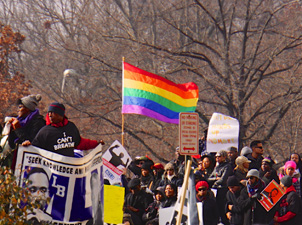
Cultivating Inclusive Community during LGBTQIA+ History Month
Virginia Schilder
October 25, 2021
One of the four cornerstones of NETWORK’s Build Anew agenda is cultivating inclusive community. This means fostering life-giving relationships – in communities and movements – that recognize our fundamental interrelatedness and the intrinsic dignity and worth of each living being. During LGBTQIA+ History Month this October, we reflect on the long history of LGBTQ+ people who have educated, organized, and lobbied for justice. We also recognize how cultivating inclusive community requires affirming our LGBTQ+ siblings and working to end all dehumanizing structures.
We are called to welcome and honor LGBTQ+ people. LGBTQ+ folks have always been a part of our communities, though their stories have often been obscured. Sister Grace Surdovel, IHM creates space for sharing and uplifting these stories in editing Love Tenderly: Sacred Stories of Lesbian and Queer Religious, a recent anthology of personal essays. The book not only makes visible the experiences of queer Catholics, but is also a work of community-building: centering compassion, vulnerability, solidarity, and hope. The religious in the communion that is this anthology are but one part of the vast body of LGBTQ+ justice-seekers calling us to shape more liberative community today.
While anti-trans legislation has been on the rise, Sister Louisa Derouen, OP has ministered among transgender people for over two decades, spending thousands of hours accompanying folks through experiences with churches, families, and transitions. Sr. Louisa writes, “Transgender people are far more attuned than most of us to the reality that we human beings are a complex, mysterious, body-spirit creation of God, and they want nothing more than to honor that reality… They are part of the body of Christ, and they deserve to be treated as the body of Christ.” Sr. Louisa captures the spirit of cultivating inclusive community: acknowledging everyone – but especially those marginalized by dominant society’s refusal to tolerate human diversity – as indispensable members of the body of Christ.
Father Bryan Massingale is a tremendous example of someone who recognizes that affirming LGBTQ+ people is inseparable from advancing a wider vision of social justice. Fr. Massingale is a Catholic priest and an ethics professor at Fordham University who came out as a gay in 2019. His leadership on racial justice as well as LGBTQ+ inclusion in the Church highlights the intersections of race, gender, sexuality, and Catholicism in the U.S. Fr. Massingale’s witness calls attention to the ways in which our structures of power deny the humanity of Black people, LGBTQ+ folks, and those with intersectional identities.
As Fr. Massingale leads us to understand, embracing queerness is not only about including LGBTQ+ people in community, but also about breaking free of all oppressive and unjust social systems. As a queer Catholic, I understand my queerness not just as my sexual identity, but as a mode of being that means challenging categories and structures that stifle flourishing, and living into life-affirming ways of relating to myself and others — which is exactly the work of social justice. In this sense, Jesus’ ministry was a beautiful example of queerness as he subverted the gender, family, and social norms of his time in radically just and life-giving ways.
To me, queerness is deeply Catholic, in that it means being attuned to how God made me as a relational being with inherent dignity and capacity to love. It means looking to God’s creation and finding a rich plurality of forms of life — each “fearfully and wonderfully made.” Justice work requires seeing each person in the fullness of their humanity, which requires affirming the varied ways in which humans love and live in authenticity. In my view, queerness is a powerful, creative basis for envisioning alternatives to structures that seek to suppress, homogenize, and limit possibilities for real flourishing and loving relationship.
By their witness and ministry, Sr. Grace, Sr. Louisa, and Fr. Massingale call us to center people and experiences on the margins over ideology in our work for justice. As we strive to enact the Build Anew agenda, let us ensure that our policies — especially in health care, housing, taxes, and workplace and family policy — include and protect members of the LGBTQ+ community and their families. Let us remember to ground our advocacy work in our encounters with our neighbors, in all their vibrant variety of gender and sexuality. And let us see queerness as a mode of being that invites us to creatively challenge oppressive social structures and imagine new forms of community that truly honor the wondrous diversity of God’s holy creation.







